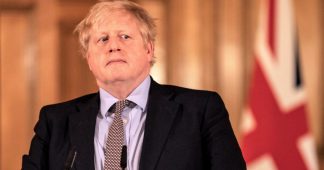Taipei’s success shows lives might have been saved had the UK government acted differently
by Emma Graham-Harrison and Helen Davidson
Mar. 24, 2021
Along central Taipei’s busy Yongkang Street crowds spill out of restaurants and bars every evening, mingling with people queueing outside popular eateries for a tiny table to cram around with groups of friends. Children out way past their bedtime run amok over the play equipment in a nearby park, shrieking and laughing as their parents chat nearby.
In London, it would be unthinkable. In the Taiwanese capital, it is just another spring evening.
Taiwan has ridden out the coronavirus pandemic mostly unscathed, while Britain has been crippled economically and in human terms. The death, disease and mental health crises sparked by lockdown have all exacted a heavy toll.
Both are islands ruled by democratic government, their large populations – more than 22 million people live in Taiwan – mostly crowded into cities, with public health systems that mean medical care is widely accessible.
At the end of 2019, both were heavily exposed to travellers carrying coronavirus: Britain because of its status as an international travel hub; Taiwan because closely woven cultural and economic ties meant hundreds of planes crossed the narrow strait to mainland China – where the virus was first detected – weekly.
A little over a year later, Britain has one of the world’s worst death rates, with more than 130,000 people lost to the virus and more than 4 million people infected. Taiwan has lost 10 people, and had just 1,000 documented cases, the vast majority of them among quarantined travellers.
The root of the difference lies in the approach their governments took.
Taiwan’s leaders, helped perhaps by having an epidemiologist as vice-president, perhaps by its experience of the outbreak of the Sars coronavirus in 2003, recognised the terrible threat posed by Covid-19, even as the earliest data trickled in. They decided the only way to protect their country, its people and economy, was to keep the virus out.
Britain, by contrast, made the catastrophic decision to treat the disease as akin to flu, aiming to limit its spread rather than stamp it out, said Jay Patel, a Covid-19 researcher at Edinburgh who studies comparative approaches to the pandemic worldwide. “Their playbook to begin with was different,” he said.
“The response plan for flu is broadly mitigation [of spread], so you try to prevent the number of cases exceeding what the healthcare capacity can handle. The Sars model [used by Taiwan] is about elimination, saying because of the casualty rate, we need to suppress this disease with a view to elimination.
“We didn’t have a Sars pandemic plan, because it didn’t seem as though that would be the next pandemic, though it seems so wrong to say that now. The western world thought the next big one would be flu and focused all their attention on that.
“The warning last February was that we will have to live with it, we can’t eliminate it. Yet even then, we could see international examples of how the virus was being eliminated.”
Continue reading at www.theguardian.com











